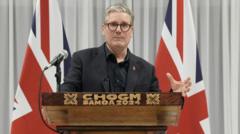During the summit, leaders acknowledged the historical injustices of the slave trade, emphasizing the necessity for an "open, honest, and respectful discussion." Sir Keir Starmer clarified, however, that the UK maintains its stance against financial reparations, focusing instead on other cooperative themes like climate resilience and trade that dominated the agenda.
While the issue of reparations was a smaller component of the summit's discussions, it represents a growing pressure on the UK from Commonwealth states seeking acknowledgment and recompense for the trauma of slavery. Various forms of reparations were suggested, from symbolic gestures to financial reparations, yet no definitive discussions on funding took place during the summit.
Although Downing Street has consistently reiterated its position against reparations, the acknowledgment of continued dialogue presents a sliver of hope for advocates of reparatory justice. Starmer noted that further discussions could occur at the UK-Caribbean forum planned for 2025, leaving the possibility open for more earnest engagement on this sensitive topic.
This ongoing dialogue is crucial as countries reflect on their historical actions and work towards reconciliation in light of their colonial pasts. The outcome of these discussions may significantly shape future diplomatic relations within the Commonwealth, revealing deep-seated tensions and potential pathways for healing.
While the issue of reparations was a smaller component of the summit's discussions, it represents a growing pressure on the UK from Commonwealth states seeking acknowledgment and recompense for the trauma of slavery. Various forms of reparations were suggested, from symbolic gestures to financial reparations, yet no definitive discussions on funding took place during the summit.
Although Downing Street has consistently reiterated its position against reparations, the acknowledgment of continued dialogue presents a sliver of hope for advocates of reparatory justice. Starmer noted that further discussions could occur at the UK-Caribbean forum planned for 2025, leaving the possibility open for more earnest engagement on this sensitive topic.
This ongoing dialogue is crucial as countries reflect on their historical actions and work towards reconciliation in light of their colonial pasts. The outcome of these discussions may significantly shape future diplomatic relations within the Commonwealth, revealing deep-seated tensions and potential pathways for healing.





















